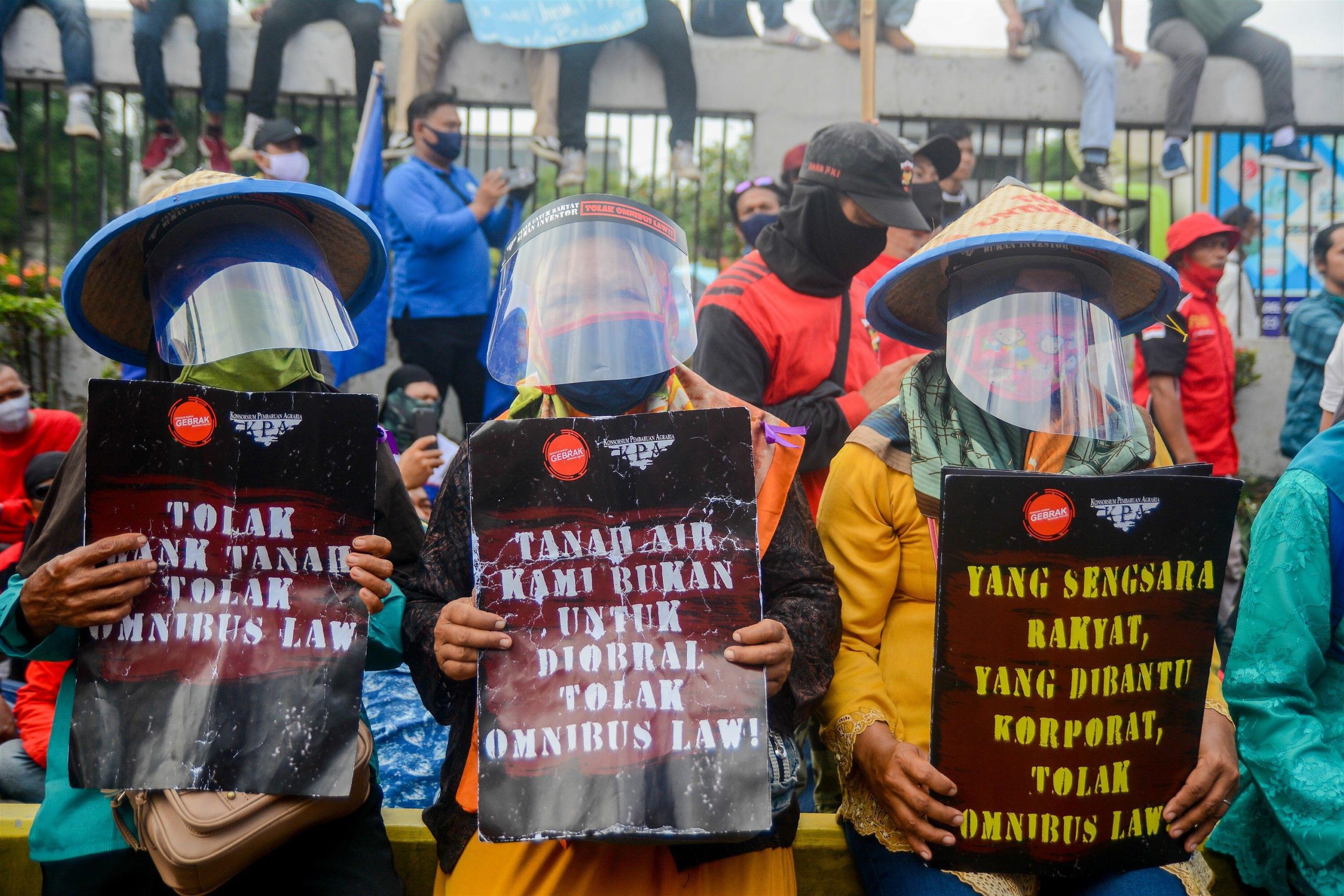
Indonesia’s Big Palm Oil Firms Silently Complicit with Pro-Deforestation Omnibus bill

Indonesia’s Big Palm Oil Firms Silently Complicit with Pro-Deforestation Omnibus bill
Bahasa Indonesia September 9, 2020
Indonesia’s palm oil industry and its global buyers should urge Indonesian President Joko “Jokowi” Widodo and Indonesian lawmakers to remove provisions of an economic stimulus “Omnibus Bill” that threaten to worsen deforestation and reverse recent successes in reducing forest loss, driven in large part by the adoption of more responsible palm oil production practices.
“This bill poses an existential threat to Indonesia’s forests – and risks dramatic economic losses for its palm oil industry, whose success is predicated on meeting international market expectations for responsible production,” said Phelim Kine, Senior Campaigns Director with Mighty Earth. “Leaders of major palm oil firms should break their silence and make it clear that this bill undermines years of progress they’ve made in driving down deforestation linked to palm oil production and will be a massive step backwards for the industry.”
Recent progress made in Indonesia by the palm oil industry in reducing deforestation and destruction of peat lands in its production chains – due in no small part to pressure and engagement from buyers, financiers, civil society groups, Indigenous peoples and frontline communities – has been a comparative bright spot in an otherwise disturbing trend of ongoing global deforestation.
An estimated 83% of palm oil refineries in Indonesia and Malaysia have committed to “No Deforestation, No Peat and No Exploitation (NDPE)” policies, an increase from 74% of refineries in November 2017. These commitments remain works in progress, but have contributed to a dramatic decline in deforestation for palm oil in Indonesia from a million acres a year to fewer than 250,000 acres in each of the past three years. Overall, according to analysis by the nongovernmental forest monitoring organization Global Forest Watch, primary forest loss in Indonesia has declined to its lowest levels since 2003.
Yet, the Indonesia parliament is poised to undo much of that progress by approving the Omnibus bill before the conclusion of the current legislative session on October 9, 2020.
The bill includes multiple provisions that analysts warn will worsen deforestation in Indonesia and by extension inflict international reputational harm on the palm oil sector. An analysis by the Indonesian nongovernmental organization Madani has warned that the bill weakens existing legal protections for natural forests with catastrophic potential impacts, including the complete destruction of natural forest cover in the provinces of Riau, Jambi, South Sumatra, Bangka Belitung and Central Java over the next two to three decades.
Some of the bill’s troublesome provisions include:
- Loosening the requirements for conducting environmental impact assessments of industrial and agribusiness projects.
- Empowering the central government to approve business and investment in officially designated forest and peatland areas, which are currently under a deforestation moratorium.
- Eliminating the current requirement that provinces maintain a minimum forest cover of 30% of provincial land and instead allowing provinces to set their own standards “proportionately.”
- Eliminating strict legal liability for companies with fires occurring on their concession areas, which has served as a key incentive for companies to prevent and extinguish fires and refrain from burning.
President Jokowi’s administration has justified the bill’s expansive provisions, which involves the insertion of 174 new articles into 79 existing laws governing areas including taxation, labor, investment and the environment, as an essential job creation tool amidst the Coronavirus pandemic.
Ironically, the bill’s problematic environmental provisions could actually worsen economic prospects for the palm oil industry. Major palm oil importers including the European Union and United Kingdom are considering increasingly more stringent environmental standards for agricultural imports, including palm oil. Industry implementation of “No Deforestation, No Peatland, No Exploitation” (NDPE) policies has helped ensure Indonesian producers can meet those standards. Passage of this Omnibus bill as is will likely encourage more deforestation by palm oil producers, tainting the industry and its customers as a whole. The bill’s pro-deforestation elements also fly in the face of the Indonesian Government’s enactment in August 2019 of a permanent moratorium on forest clearing for timber and plantation development.
Despite the reputational and economic stakes, major palm oil traders including Wilmar, Golden Agri, Musim Mas, Bunge, Sime Darby, and Louis Dreyfus have failed to voice concerns about the Omnibus Bill. Major consumer goods producers including Unilever and Nestle, who have committed to NDPE policies, have likewise appeared silent about the bill.
The glaring exception to this has been PT Astra Agro Lestari Tbk, a subsidiary of the British conglomerate Jardine Matheson, which has, through its leadership, expressed support for the bill. Astra Agro Lestari, Indonesia’s second largest palm oil producer, has significant influence within both the palm oil sector and the Indonesian government through Joko Supriyono, Astra’s Vice President Director and Chairman of the Indonesian Palm Oil Producers Association, or GAPKI.
Despite Astra’s adoption in 2015 of a No Deforestation policy, in February 2020, Supriyono expressed unqualified support for the Omnibus Bill as “a solution to the complexity of licensing in the palm oil sector.” He added that “GAPKI must be part of the birth of the Omnibus Law by actively contributing to it. This is none other than the interests of the national palm oil sector.” Since that full-throated expression of support for the Omnibus Bill GAPKI, Supriyono and Jardine Matheson subsidiary Astra Agro Lestari have ignored the bill’s ramifications for Indonesia’s forests.
The importance of the palm oil sector in engaging the Indonesian government on the dangers posed by the Omnibus Bill is heightened by the Government’s inadequate public consultation on the bill’s substance and implications. In July a coalition of Indonesian environmental and civil society groups flagged that failure in a public letter to domestic and international financiers, warning that the bill’s passage will mean that “Indonesian current laws and regulations will no longer comply with globally accepted environmental and social safeguards.”
The palm oil sector has an opportunity to divert the serious long term economic and environmental fallout posed by the bill by taking the following steps:
- Immediately conveying its concerns about the elements of the bill that undermine the forest conservation and human rights agenda to Jokowi’s office and the Indonesian parliament
- Urging the Government to freeze proceedings on the bill until it undertakes proper consultations with environmental and civil society groups
- Advocating for environmental and agricultural policies that boost economic growth while conserving forests and peatlands and recognizing the customary land rights of Indigenous peoples


